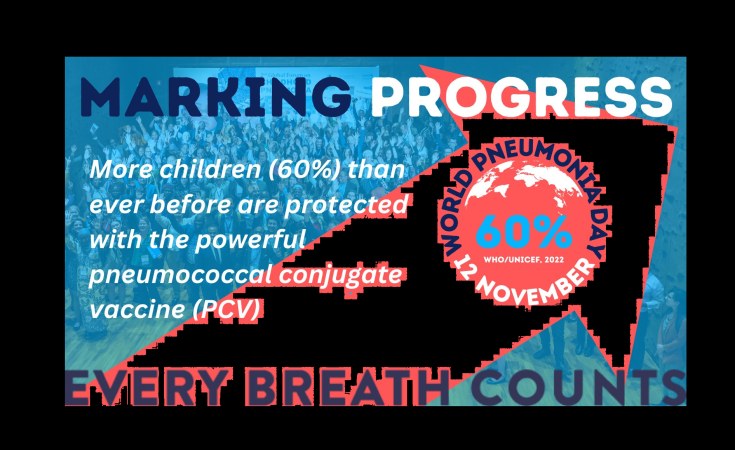Pneumonia is the single biggest infectious killer of adults and children – claiming the lives of 2.2 million, including 502,000 children under five, in 2021 according to the Global Burden of Disease. Pneumonia-causing pathogens are also the most likely cause of the next pandemic, according to the latest Disease Control Priorities estimates.
This year, for World Pneumonia Day 2024, we are highlighting the partnerships with the power to both accelerate current mortality declines and protect against pandemic risk, because they are focused on mobilizing multiple organizations to work together to increase coverage of the most lifesaving interventions.
This is especially important among children under five as the world is very close to achieving the Global Pneumonia Target of three child pneumonia deaths for every 1,000 babies born. To achieve this target by 2025, child pneumonia deaths need to fall from the current 502,000 per year to 397,000 – very achievable.
Further, success at reducing child pneumonia deaths will help countries achieve the broader Sustainable Development Goal for Child Survival (SDG 3.2) by the 2030 deadline. Currently, 64 countries are not on track to achieve the neonatal target (12 newborn deaths for every 1,000 babies born) and 52 countries are off-track to achieve the post-neonatal target (13 deaths among children aged 1-59 months for every 1,000 children aged 28 days). As pneumonia is a leading killer of children in both the neonatal (153,000 deaths) and post-neonatal (349,000 deaths) periods, reducing these deaths will have a major impact on the global goal.
But we cannot ignore pneumonia's massive burden of adults, especially the elderly, and the risk of another respiratory pandemic killing millions.
The Partnerships for Progress highlighted this World Pneumonia Day include governments, global health agencies, foundations, industry, and CSOs joining forces to:
- Introduce and scale more affordable PCV vaccines for children
- Accelerate access to RSV vaccines for pregnant women and monoclonal antibodies for newborns
- Integrate nutrition services with vaccine delivery
- Improve the use of pulse oximetry and access to medical oxygen
- Discover better tools to diagnose pneumonia (e.g., cough sounds, lung ultrasound, AI-enabled, etc.)
- Invest in biomedical engineering capacity to ensure functionality of medical technologies in the health system to save lives now and prepare for the next pandemic
- Mitigate the triple risks of respiratory pandemics, climate change, and antimicrobial resistance


